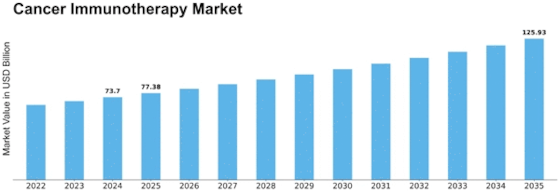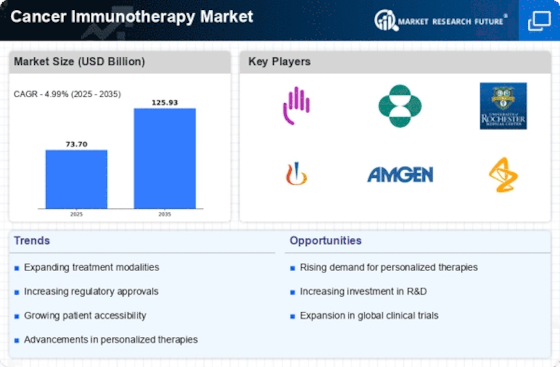Monoclonal Antibodies
Check Point Inhibitors
Cancer Vaccines
Therapeutic T-Cells
Oncolytic Virus Therapy
Breast Cancer
Lung Cancer
Colorectal Cancer
Prostate Cancer
Melanoma
Hospitals
Cancer Research Institutes
Diagnostics Labs
Intravenous
Subcutaneous
Intramuscular
North America
Europe
South America
Asia Pacific
Middle East and Africa
North America Outlook (USD Billion, 2019-2035)
Cancer Immunotherapy Market by Therapy Type
Monoclonal Antibodies
Check Point Inhibitors
Cancer Vaccines
Therapeutic T-Cells
Oncolytic Virus Therapy
Cancer Immunotherapy Market by Cancer Type
Breast Cancer
Lung Cancer
Colorectal Cancer
Prostate Cancer
Melanoma
Cancer Immunotherapy Market by End User Type
Hospitals
Cancer Research Institutes
Diagnostics Labs
Cancer Immunotherapy Market by Route of Administration Type
Intravenous
Subcutaneous
Intramuscular
Cancer Immunotherapy Market by Regional Type
US
Canada
US Outlook (USD Billion, 2019-2035)
Cancer Immunotherapy Market by Therapy Type
Monoclonal Antibodies
Check Point Inhibitors
Cancer Vaccines
Therapeutic T-Cells
Oncolytic Virus Therapy
Cancer Immunotherapy Market by Cancer Type
Breast Cancer
Lung Cancer
Colorectal Cancer
Prostate Cancer
Melanoma
Cancer Immunotherapy Market by End User Type
Hospitals
Cancer Research Institutes
Diagnostics Labs
Cancer Immunotherapy Market by Route of Administration Type
Intravenous
Subcutaneous
Intramuscular
CANADA Outlook (USD Billion, 2019-2035)
Cancer Immunotherapy Market by Therapy Type
Monoclonal Antibodies
Check Point Inhibitors
Cancer Vaccines
Therapeutic T-Cells
Oncolytic Virus Therapy
Cancer Immunotherapy Market by Cancer Type
Breast Cancer
Lung Cancer
Colorectal Cancer
Prostate Cancer
Melanoma
Cancer Immunotherapy Market by End User Type
Hospitals
Cancer Research Institutes
Diagnostics Labs
Cancer Immunotherapy Market by Route of Administration Type
Intravenous
Subcutaneous
Intramuscular
Europe Outlook (USD Billion, 2019-2035)
Cancer Immunotherapy Market by Therapy Type
Monoclonal Antibodies
Check Point Inhibitors
Cancer Vaccines
Therapeutic T-Cells
Oncolytic Virus Therapy
Cancer Immunotherapy Market by Cancer Type
Breast Cancer
Lung Cancer
Colorectal Cancer
Prostate Cancer
Melanoma
Cancer Immunotherapy Market by End User Type
Hospitals
Cancer Research Institutes
Diagnostics Labs
Cancer Immunotherapy Market by Route of Administration Type
Intravenous
Subcutaneous
Intramuscular
Cancer Immunotherapy Market by Regional Type
Germany
UK
France
Russia
Italy
Spain
Rest of Europe
GERMANY Outlook (USD Billion, 2019-2035)
Cancer Immunotherapy Market by Therapy Type
Monoclonal Antibodies
Check Point Inhibitors
Cancer Vaccines
Therapeutic T-Cells
Oncolytic Virus Therapy
Cancer Immunotherapy Market by Cancer Type
Breast Cancer
Lung Cancer
Colorectal Cancer
Prostate Cancer
Melanoma
Cancer Immunotherapy Market by End User Type
Hospitals
Cancer Research Institutes
Diagnostics Labs
Cancer Immunotherapy Market by Route of Administration Type
Intravenous
Subcutaneous
Intramuscular
UK Outlook (USD Billion, 2019-2035)
Cancer Immunotherapy Market by Therapy Type
Monoclonal Antibodies
Check Point Inhibitors
Cancer Vaccines
Therapeutic T-Cells
Oncolytic Virus Therapy
Cancer Immunotherapy Market by Cancer Type
Breast Cancer
Lung Cancer
Colorectal Cancer
Prostate Cancer
Melanoma
Cancer Immunotherapy Market by End User Type
Hospitals
Cancer Research Institutes
Diagnostics Labs
Cancer Immunotherapy Market by Route of Administration Type
Intravenous
Subcutaneous
Intramuscular
FRANCE Outlook (USD Billion, 2019-2035)
Cancer Immunotherapy Market by Therapy Type
Monoclonal Antibodies
Check Point Inhibitors
Cancer Vaccines
Therapeutic T-Cells
Oncolytic Virus Therapy
Cancer Immunotherapy Market by Cancer Type
Breast Cancer
Lung Cancer
Colorectal Cancer
Prostate Cancer
Melanoma
Cancer Immunotherapy Market by End User Type
Hospitals
Cancer Research Institutes
Diagnostics Labs
Cancer Immunotherapy Market by Route of Administration Type
Intravenous
Subcutaneous
Intramuscular
RUSSIA Outlook (USD Billion, 2019-2035)
Cancer Immunotherapy Market by Therapy Type
Monoclonal Antibodies
Check Point Inhibitors
Cancer Vaccines
Therapeutic T-Cells
Oncolytic Virus Therapy
Cancer Immunotherapy Market by Cancer Type
Breast Cancer
Lung Cancer
Colorectal Cancer
Prostate Cancer
Melanoma
Cancer Immunotherapy Market by End User Type
Hospitals
Cancer Research Institutes
Diagnostics Labs
Cancer Immunotherapy Market by Route of Administration Type
Intravenous
Subcutaneous
Intramuscular
ITALY Outlook (USD Billion, 2019-2035)
Cancer Immunotherapy Market by Therapy Type
Monoclonal Antibodies
Check Point Inhibitors
Cancer Vaccines
Therapeutic T-Cells
Oncolytic Virus Therapy
Cancer Immunotherapy Market by Cancer Type
Breast Cancer
Lung Cancer
Colorectal Cancer
Prostate Cancer
Melanoma
Cancer Immunotherapy Market by End User Type
Hospitals
Cancer Research Institutes
Diagnostics Labs
Cancer Immunotherapy Market by Route of Administration Type
Intravenous
Subcutaneous
Intramuscular
SPAIN Outlook (USD Billion, 2019-2035)
Cancer Immunotherapy Market by Therapy Type
Monoclonal Antibodies
Check Point Inhibitors
Cancer Vaccines
Therapeutic T-Cells
Oncolytic Virus Therapy
Cancer Immunotherapy Market by Cancer Type
Breast Cancer
Lung Cancer
Colorectal Cancer
Prostate Cancer
Melanoma
Cancer Immunotherapy Market by End User Type
Hospitals
Cancer Research Institutes
Diagnostics Labs
Cancer Immunotherapy Market by Route of Administration Type
Intravenous
Subcutaneous
Intramuscular
REST OF EUROPE Outlook (USD Billion, 2019-2035)
Cancer Immunotherapy Market by Therapy Type
Monoclonal Antibodies
Check Point Inhibitors
Cancer Vaccines
Therapeutic T-Cells
Oncolytic Virus Therapy
Cancer Immunotherapy Market by Cancer Type
Breast Cancer
Lung Cancer
Colorectal Cancer
Prostate Cancer
Melanoma
Cancer Immunotherapy Market by End User Type
Hospitals
Cancer Research Institutes
Diagnostics Labs
Cancer Immunotherapy Market by Route of Administration Type
Intravenous
Subcutaneous
Intramuscular
APAC Outlook (USD Billion, 2019-2035)
Cancer Immunotherapy Market by Therapy Type
Monoclonal Antibodies
Check Point Inhibitors
Cancer Vaccines
Therapeutic T-Cells
Oncolytic Virus Therapy
Cancer Immunotherapy Market by Cancer Type
Breast Cancer
Lung Cancer
Colorectal Cancer
Prostate Cancer
Melanoma
Cancer Immunotherapy Market by End User Type
Hospitals
Cancer Research Institutes
Diagnostics Labs
Cancer Immunotherapy Market by Route of Administration Type
Intravenous
Subcutaneous
Intramuscular
Cancer Immunotherapy Market by Regional Type
China
India
Japan
South Korea
Malaysia
Thailand
Indonesia
Rest of APAC
CHINA Outlook (USD Billion, 2019-2035)
Cancer Immunotherapy Market by Therapy Type
Monoclonal Antibodies
Check Point Inhibitors
Cancer Vaccines
Therapeutic T-Cells
Oncolytic Virus Therapy
Cancer Immunotherapy Market by Cancer Type
Breast Cancer
Lung Cancer
Colorectal Cancer
Prostate Cancer
Melanoma
Cancer Immunotherapy Market by End User Type
Hospitals
Cancer Research Institutes
Diagnostics Labs
Cancer Immunotherapy Market by Route of Administration Type
Intravenous
Subcutaneous
Intramuscular
INDIA Outlook (USD Billion, 2019-2035)
Cancer Immunotherapy Market by Therapy Type
Monoclonal Antibodies
Check Point Inhibitors
Cancer Vaccines
Therapeutic T-Cells
Oncolytic Virus Therapy
Cancer Immunotherapy Market by Cancer Type
Breast Cancer
Lung Cancer
Colorectal Cancer
Prostate Cancer
Melanoma
Cancer Immunotherapy Market by End User Type
Hospitals
Cancer Research Institutes
Diagnostics Labs
Cancer Immunotherapy Market by Route of Administration Type
Intravenous
Subcutaneous
Intramuscular
JAPAN Outlook (USD Billion, 2019-2035)
Cancer Immunotherapy Market by Therapy Type
Monoclonal Antibodies
Check Point Inhibitors
Cancer Vaccines
Therapeutic T-Cells
Oncolytic Virus Therapy
Cancer Immunotherapy Market by Cancer Type
Breast Cancer
Lung Cancer
Colorectal Cancer
Prostate Cancer
Melanoma
Cancer Immunotherapy Market by End User Type
Hospitals
Cancer Research Institutes
Diagnostics Labs
Cancer Immunotherapy Market by Route of Administration Type
Intravenous
Subcutaneous
Intramuscular
SOUTH KOREA Outlook (USD Billion, 2019-2035)
Cancer Immunotherapy Market by Therapy Type
Monoclonal Antibodies
Check Point Inhibitors
Cancer Vaccines
Therapeutic T-Cells
Oncolytic Virus Therapy
Cancer Immunotherapy Market by Cancer Type
Breast Cancer
Lung Cancer
Colorectal Cancer
Prostate Cancer
Melanoma
Cancer Immunotherapy Market by End User Type
Hospitals
Cancer Research Institutes
Diagnostics Labs
Cancer Immunotherapy Market by Route of Administration Type
Intravenous
Subcutaneous
Intramuscular
MALAYSIA Outlook (USD Billion, 2019-2035)
Cancer Immunotherapy Market by Therapy Type
Monoclonal Antibodies
Check Point Inhibitors
Cancer Vaccines
Therapeutic T-Cells
Oncolytic Virus Therapy
Cancer Immunotherapy Market by Cancer Type
Breast Cancer
Lung Cancer
Colorectal Cancer
Prostate Cancer
Melanoma
Cancer Immunotherapy Market by End User Type
Hospitals
Cancer Research Institutes
Diagnostics Labs
Cancer Immunotherapy Market by Route of Administration Type
Intravenous
Subcutaneous
Intramuscular
THAILAND Outlook (USD Billion, 2019-2035)
Cancer Immunotherapy Market by Therapy Type
Monoclonal Antibodies
Check Point Inhibitors
Cancer Vaccines
Therapeutic T-Cells
Oncolytic Virus Therapy
Cancer Immunotherapy Market by Cancer Type
Breast Cancer
Lung Cancer
Colorectal Cancer
Prostate Cancer
Melanoma
Cancer Immunotherapy Market by End User Type
Hospitals
Cancer Research Institutes
Diagnostics Labs
Cancer Immunotherapy Market by Route of Administration Type
Intravenous
Subcutaneous
Intramuscular
INDONESIA Outlook (USD Billion, 2019-2035)
Cancer Immunotherapy Market by Therapy Type
Monoclonal Antibodies
Check Point Inhibitors
Cancer Vaccines
Therapeutic T-Cells
Oncolytic Virus Therapy
Cancer Immunotherapy Market by Cancer Type
Breast Cancer
Lung Cancer
Colorectal Cancer
Prostate Cancer
Melanoma
Cancer Immunotherapy Market by End User Type
Hospitals
Cancer Research Institutes
Diagnostics Labs
Cancer Immunotherapy Market by Route of Administration Type
Intravenous
Subcutaneous
Intramuscular
REST OF APAC Outlook (USD Billion, 2019-2035)
Cancer Immunotherapy Market by Therapy Type
Monoclonal Antibodies
Check Point Inhibitors
Cancer Vaccines
Therapeutic T-Cells
Oncolytic Virus Therapy
Cancer Immunotherapy Market by Cancer Type
Breast Cancer
Lung Cancer
Colorectal Cancer
Prostate Cancer
Melanoma
Cancer Immunotherapy Market by End User Type
Hospitals
Cancer Research Institutes
Diagnostics Labs
Cancer Immunotherapy Market by Route of Administration Type
Intravenous
Subcutaneous
Intramuscular
South America Outlook (USD Billion, 2019-2035)
Cancer Immunotherapy Market by Therapy Type
Monoclonal Antibodies
Check Point Inhibitors
Cancer Vaccines
Therapeutic T-Cells
Oncolytic Virus Therapy
Cancer Immunotherapy Market by Cancer Type
Breast Cancer
Lung Cancer
Colorectal Cancer
Prostate Cancer
Melanoma
Cancer Immunotherapy Market by End User Type
Hospitals
Cancer Research Institutes
Diagnostics Labs
Cancer Immunotherapy Market by Route of Administration Type
Intravenous
Subcutaneous
Intramuscular
Cancer Immunotherapy Market by Regional Type
Brazil
Mexico
Argentina
Rest of South America
BRAZIL Outlook (USD Billion, 2019-2035)
Cancer Immunotherapy Market by Therapy Type
Monoclonal Antibodies
Check Point Inhibitors
Cancer Vaccines
Therapeutic T-Cells
Oncolytic Virus Therapy
Cancer Immunotherapy Market by Cancer Type
Breast Cancer
Lung Cancer
Colorectal Cancer
Prostate Cancer
Melanoma
Cancer Immunotherapy Market by End User Type
Hospitals
Cancer Research Institutes
Diagnostics Labs
Cancer Immunotherapy Market by Route of Administration Type
Intravenous
Subcutaneous
Intramuscular
MEXICO Outlook (USD Billion, 2019-2035)
Cancer Immunotherapy Market by Therapy Type
Monoclonal Antibodies
Check Point Inhibitors
Cancer Vaccines
Therapeutic T-Cells
Oncolytic Virus Therapy
Cancer Immunotherapy Market by Cancer Type
Breast Cancer
Lung Cancer
Colorectal Cancer
Prostate Cancer
Melanoma
Cancer Immunotherapy Market by End User Type
Hospitals
Cancer Research Institutes
Diagnostics Labs
Cancer Immunotherapy Market by Route of Administration Type
Intravenous
Subcutaneous
Intramuscular
ARGENTINA Outlook (USD Billion, 2019-2035)
Cancer Immunotherapy Market by Therapy Type
Monoclonal Antibodies
Check Point Inhibitors
Cancer Vaccines
Therapeutic T-Cells
Oncolytic Virus Therapy
Cancer Immunotherapy Market by Cancer Type
Breast Cancer
Lung Cancer
Colorectal Cancer
Prostate Cancer
Melanoma
Cancer Immunotherapy Market by End User Type
Hospitals
Cancer Research Institutes
Diagnostics Labs
Cancer Immunotherapy Market by Route of Administration Type
Intravenous
Subcutaneous
Intramuscular
REST OF SOUTH AMERICA Outlook (USD Billion, 2019-2035)
Cancer Immunotherapy Market by Therapy Type
Monoclonal Antibodies
Check Point Inhibitors
Cancer Vaccines
Therapeutic T-Cells
Oncolytic Virus Therapy
Cancer Immunotherapy Market by Cancer Type
Breast Cancer
Lung Cancer
Colorectal Cancer
Prostate Cancer
Melanoma
Cancer Immunotherapy Market by End User Type
Hospitals
Cancer Research Institutes
Diagnostics Labs
Cancer Immunotherapy Market by Route of Administration Type
Intravenous
Subcutaneous
Intramuscular
MEA Outlook (USD Billion, 2019-2035)
Cancer Immunotherapy Market by Therapy Type
Monoclonal Antibodies
Check Point Inhibitors
Cancer Vaccines
Therapeutic T-Cells
Oncolytic Virus Therapy
Cancer Immunotherapy Market by Cancer Type
Breast Cancer
Lung Cancer
Colorectal Cancer
Prostate Cancer
Melanoma
Cancer Immunotherapy Market by End User Type
Hospitals
Cancer Research Institutes
Diagnostics Labs
Cancer Immunotherapy Market by Route of Administration Type
Intravenous
Subcutaneous
Intramuscular
Cancer Immunotherapy Market by Regional Type
GCC Countries
South Africa
Rest of MEA
GCC COUNTRIES Outlook (USD Billion, 2019-2035)
Cancer Immunotherapy Market by Therapy Type
Monoclonal Antibodies
Check Point Inhibitors
Cancer Vaccines
Therapeutic T-Cells
Oncolytic Virus Therapy
Cancer Immunotherapy Market by Cancer Type
Breast Cancer
Lung Cancer
Colorectal Cancer
Prostate Cancer
Melanoma
Cancer Immunotherapy Market by End User Type
Hospitals
Cancer Research Institutes
Diagnostics Labs
Cancer Immunotherapy Market by Route of Administration Type
Intravenous
Subcutaneous
Intramuscular
SOUTH AFRICA Outlook (USD Billion, 2019-2035)
Cancer Immunotherapy Market by Therapy Type
Monoclonal Antibodies
Check Point Inhibitors
Cancer Vaccines
Therapeutic T-Cells
Oncolytic Virus Therapy
Cancer Immunotherapy Market by Cancer Type
Breast Cancer
Lung Cancer
Colorectal Cancer
Prostate Cancer
Melanoma
Cancer Immunotherapy Market by End User Type
Hospitals
Cancer Research Institutes
Diagnostics Labs
Cancer Immunotherapy Market by Route of Administration Type
Intravenous
Subcutaneous
Intramuscular
REST OF MEA Outlook (USD Billion, 2019-2035)
Cancer Immunotherapy Market by Therapy Type
Monoclonal Antibodies
Check Point Inhibitors
Cancer Vaccines
Therapeutic T-Cells
Oncolytic Virus Therapy
Cancer Immunotherapy Market by Cancer Type
Breast Cancer
Lung Cancer
Colorectal Cancer
Prostate Cancer
Melanoma
Cancer Immunotherapy Market by End User Type
Hospitals
Cancer Research Institutes
Diagnostics Labs
Cancer Immunotherapy Market by Route of Administration Type
Intravenous
Subcutaneous
Intramuscular



















Leave a Comment